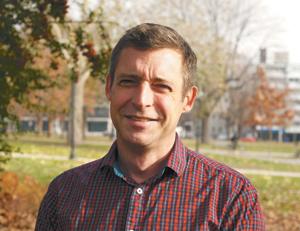When I hear Brian Finch’s voice, it’s not quite what I had anticipated.
I’d expected the founder of the Positive Lite website to have the thunderous tone of a go-getting publisher used to asking tough questions. Instead, speaking about his work, his tone is light with long, winding phrases.
“I wanted to include things that are part of all of our lives . . . we’re HIV-positive, but it’s not the thing that defines us,” he says.
Finch says that when he first dipped his toes into writing in 2005, with a blog called Acid Reflux, he was inspired by the irreverent style of an earlier San Francisco zine called Diseased Pariah News. “Some people were quite horrified, but I really liked it. I thought it was quite funny,” he says.
“These were dark times and they required humour,” he explains on his website.
Now, Finch’s labour of love is more of an online lifestyle magazine. It’s grown into an increasingly powerful outlet for the poz community. Finch says the site started off with 600 hits per month and now gets more than 20,000.
“All of which was done with no budget for advertising and solely on the back of using social media,” he says.
Toronto activist Tim McCaskell says Positive Lite plays a crucial role, especially in tackling lingering stigma against HIV-positive people.
“It’s important to personalize people living with HIV as kind of real and ordinary,” he says.
McCaskell says increased access to treatment has also resulted in increased invisibility of HIV/AIDS. “It’s not written on our faces and on our bodies” the way it once was, he explains.
For Finch, coming out as HIV-positive in Winnipeg in the late ’80s meant he rarely had that chance to feel invisible.
“There was almost no one except for me who was really willing to be public with those kind of things,” he says.
Finch found out he was HIV-positive in 1987. He was 22. “I decided to take the test then because it seemed like the thing to do. Lots of people were getting it,” he wrote in an email. “I really thought there was nothing to worry about.”
Finch’s ballsy approach would make him a key player in AIDS activism around the country. After working with the Village Clinic in Winnipeg, then AIDS Regina in Saskatchewan, he moved to Toronto in 1992. He took a job with the PWA Foundation as the speakers’ bureau coordinator.
Finch’s journey then took a detour. After years of working with AIDS service organizations, he was exhausted. He took a disability leave in 1999 — a choice he later regretted.
“I created a self-fulfilling prophecy with my health,” he says. “That’s when I got into the partying and the travelling . . . the wilder, the crazier, the better.”
Finch filled a void once taken up by activism with partying, sex work and drugs.
“I lost all my anchors,” he says. “Work provided me with . . . a sense of purpose. I kind of drifted into using, got into the crystal meth, all that kind of stuff.”
Yet while he regrets going on disability leave, he has no regrets about the rest.
For Bob Leahy, a contributing editor to Positive Lite, Finch’s experience with the site was “a journey into respectability.”
“I think Positive Lite was really the impetus for changing his life around,” he says. “He’d probably kill me for saying that,” he adds playfully.
Finch doesn’t see it that way. “I really downplay that particular part of my life,” he says. “I’ve been very open about it. I certainly have no shame about it . . . It’s just so far away from where I am today.”
Besides, in the post-party years, Finch has had bigger adventures. In August 2006, he worked with the Canadian Treatment Action Council on a creative action for the 16th International AIDS Conference in Toronto.
Despite being on a difficult anti-retroviral regime, Finch painted 1,000 pillowcases lambasting Stephen Harper for skipping the event.
“Sleep in, Steve?” read some of the pillowcases, which were held up by activists while then-industry minister Tony Clement addressed the gathering. “HIV never sleeps! Time to deliver.”
“It was a media splash,” Finch remembers.
In 2007, Finch had the chance to visit a women’s sewing cooperative, called Ineza, in Kigali, Rwanda. The experience, he says, was transformative.
Many in the cooperative are HIV-positive survivors of the 1994 Rwanda genocide. “[We gave] them hope because they’d never met anyone that lived so long with [HIV],” Finch says.
He vowed to return, and his own co-op raised more than $5,000 for the We-Act microcredit project, which funds Ineza.
“We take a lot for granted here,” he says. “Sometimes I have to remind myself that.”


 Why you can trust Xtra
Why you can trust Xtra


